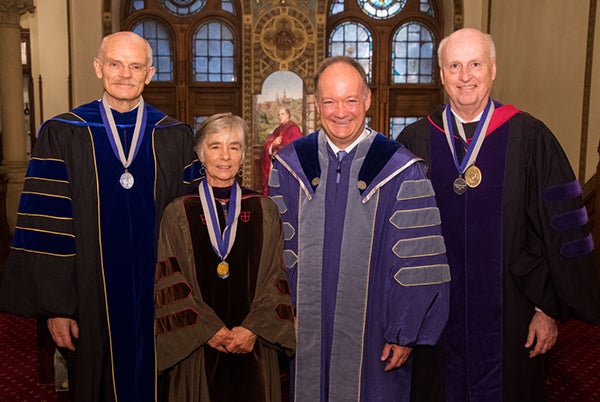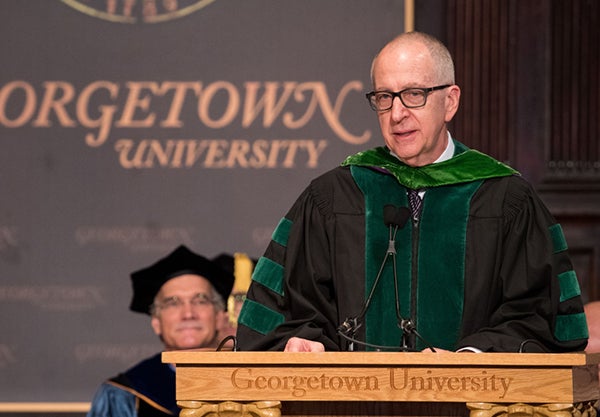Title: Professors Honored for Achievements at Fall Faculty Convocation
Georgetown recognizes the exceptional teaching and scholarship of three professors – one each from the Main, Law Center and Medical Center campuses – and announces promotions of more than 30 faculty members.
 – The university community gathered last night to recognize the exceptional teaching and scholarship of three professors one each from the Main, Law Center and Medical Center campuses – and to announce promotions of more than 30 faculty members.
– The university community gathered last night to recognize the exceptional teaching and scholarship of three professors one each from the Main, Law Center and Medical Center campuses – and to announce promotions of more than 30 faculty members.
The President’s Award for Distinguished Scholar-Teachers is awarded every year at Fall Faculty Convocation. Last night it went to Darlene Howard, the Davis Family Distinguished Professor of psychology; Donald Langevoort, the Thomas Aquinas Professor of Law; and Dr. Anton Wellstein, professor of oncology and pharmacology at Georgetown’s Lombardi Comprehensive Cancer Center.
“It’s a privilege to honor each of you today for your commitment to the highest standard of academic excellence,” said Georgetown President John J. DeGioia. “These colleagues have each made an extraordinary impact on our community with the integration of ambitious research and outstanding engagement with our students.”
Learning and Memory
Howard received her medal for investigating which cognitive and neural systems decline and which are spared in the course of healthy aging.
The National Institute on Aging has consistently funded her research, which focuses on implicit learning and memory.
She also serves on the editorial boards of the Journal of Experimental Psychology; Learning, Memory, and Cognition; Experimental Aging Research; and Aging, Neuropsychology and Cognition.
Cited by Supreme Court
The Georgetown community recognized Langevoort for his excellence in teaching courses on contracts, securities regulation and holding seminars on securities issues and corporations.
He is the co-author of Securities Regulation: Cases and Materials (Aspen Publishers, 2013) and the author of Insider Trading: Regulation, Enforcement and Prevention (West Group, 2002).
The legal scholar also has written extensively on corporate and securities law and legal ethics, work cited in opinions issued by U.S. Supreme Court justices and that continues to shape discussions of insider trading and securities litigation reform.
Therapeutic Targets
Wellstein’s cancer research focuses on factors in the development of new blood cells released from tumor cells as molecularly defined therapeutic targets.
He investigates clearer paths to developing targeted therapies for a variety of cancers and their subtypes and has written extensively on signaling and biomarkers in cancer for numerous scholarly publications.
Each presidential awardee received a medal for the excellence of their contributions to research, scholarship and teaching.
“This medal was designed to recognize those faculty among us who excel both in research accomplishments and teaching effectiveness,” said Georgetown Provost Robert Groves.“They therefore teach us every day that these two sides of an academic are not in conflict, but can be jointly achieved.We hold them up as models for us all.”
Humanities’ Lagging Budget

Dr. David Skorton, secretary of the Smithsonian Institution and a distinguished professor at Georgetown, delivered the keynote address on the aims of education during the convocation.
Skorton, leader of the nation’s largest research and museum complex with a global network of more than 19 museums and galleries, said the humanities have always lagged behind in funding when compared to the sciences.
“It is obvious when you look at the size and pattern of funding for the budgets for the National Endowment for the Humanities and the National Endowment for the Arts,” he said, noting that the NEH budget is less than 1 percent of the federal budget for scientific research and less than one-tenth of 1 percent of the federal research and development budget.
“I don’t mean to minimize the importance of science, technology, engineering, mathematics and medicine,” said Skorton, who started his career as a physician and also served as president of Cornell University. “There is no question that we need those disciplines to help us understand the world within us and around us.”
He added that a broad-based education is key to important for our people and our nation as a democracy.
“We need people who can have a broader perspective, who can think laterally, who can solve problems,” he said.